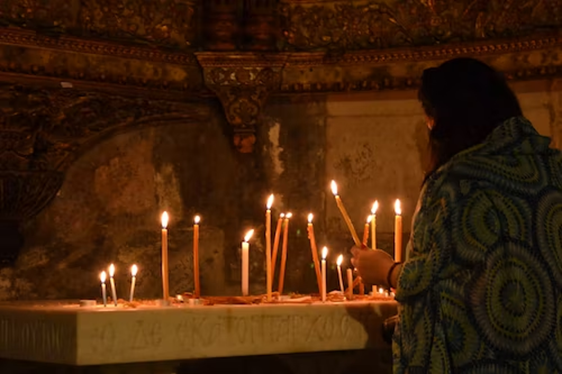
World Interfaith Harmony Week was first proposed by King Abdullah II of Jordan and established in 2010 by the United Nations. It is an event Peter Mousaferiadis has participated in every year since its inception. For 8 years, he served as a Global Trustee of United Religions Initiative, the largest grassroots interfaith initiative dedicated to cultivating justice and peace. In his roles advocating for diversity and inclusion for more than 30 years, Peter has constantly encouraged people to experience new cultures, religions and perspectives. Here, as World Interfaith Harmony Week 2023 (1–7 February) recedes into the past, he considers the neglected role of religion in the Diversity, Equity and Inclusion (DEI) field.
Societies are not secular and never have been. They are composed of people, and people come with their own values, rituals and religions or worldviews – their own ways of making sense of the world. (Note also that many belief systems that include cultural practices cannot be defined neatly in terms of a religious–secular binary.) Every one of us identifies to some extent with one or more of the 8500+ secular and non-secular traditions of humanity, traditions that are foundational to our sense of self and give daily expression, guidance and meaning to every aspect of our lives. For many people, their religion or worldview is the most important aspect of their identity.
The multidimensional value and great variety of belief systems is why freedom of faith and religion, including the belief systems of those with no religion, is vitally important to healthy, functioning democratic societies and our economies. And yet almost all Diversity, Equity and Inclusion (DEI) work grossly overlooks this component of diversity.
Often when government, media, non-profit and community organisations consider a belief system or religion, they view it as a monolith. Or they may identify many branches of Christianity, but not of Islam, Buddhism or Hinduism. Yet DEI professionals employed to help organisations in their DEI efforts rarely give any attention to worldviews and religions. The effect of this neglect is that many people’s needs – for recognition, understanding or more practical considerations – are not well met. Workers can feel obliged to leave important aspects of themselves at home, and this necessarily affects their sense of belonging, obstructs their full contribution to society and denies them a culturally safe workplace.
The concept of cultural safety came from the New Zealand / Aotearoa healthcare sector and is now in wide use in Australia. Cultural safety has been defined as the creation of a safe environment for all people ‘where there is no assault, challenge or denial of their identity, of who they are and what they need. It is about shared respect, shared meaning, shared knowledge and experience of learning, living and working together with dignity and truly listening.’*
For DEI work to be effective in meeting society’s demands for more diversity, equity and inclusion within the workplace, to go beyond a temporary or performative box-ticking exercise, it needs to illuminate the gaps in understanding between people.
Limited datasets give organisations insufficient information on who we are. Because all policy-making relies on data, the consequences of relying on selective data can be tragic.
There are more than 8500 organised religions, subgroups and other non secular and secular traditions in the world, but the vast number of these are not acknowledged in government census collections. The Australian Census, for instance, only includes about 170 religions in its dataset.
In Australia’s 2021 Census, only 43.9% of Australians identified with Christianity – a far cry from the 88.2% figure in 1966. At the same time, people identifying with ‘no religion’ has risen sharply from 0.8% to 38.9%. So, we are seeing Christianity on the decline in Australia and ‘no religion’ on the rise, while the fastest growth in religions is Hinduism at 2.7% and Islam at 3.2%.
‘No religion’ has been the number one response in the Census since 2016, but this information does not provide us with deep statistical insight because of the vagueness of the term; it must cover a range of disparate worldviews that the government remains ignorant of.
I’ve written elsewhere about the problem known as ‘survivorship bias’. Partial information leads to ignorance, distortion, fear and ultimately poor policies. There is a clear need for more inclusive data in our societies.
The paramount importance of inclusive datasets where every single human being is counted is why Cultural Infusion developed the knowledge-based analytics tool Diversity Atlas. This tool relies on datasets of more than 45,000 identity markers, including the more-than 8500 secular and non-secular traditions, which equates to representation for many more people than have ever existed on the planet.
We imagine a world where everyone is included, counted and valued for who they are.
A world where there are no longer invisible groups.
A world where no one is expected to leave an important aspect of their identity behind.
We have the technology to help transform the attitudes that stand in the way of realising such a world.
DEI must stop neglecting diverse religious traditions or it will fail to meet the needs of organisations and, by extension, society. Culturally safe and harmonious workplaces and communities can only be achieved if the organisations society relies on extend fully to incorporate the important dimension of belief systems.
*R Williams, ‘Cultural Safety – what does it mean for our work practice?’ (1999) 23(2) Australian and New Zealand Journal of Public Health, p 213.
Share this Post
